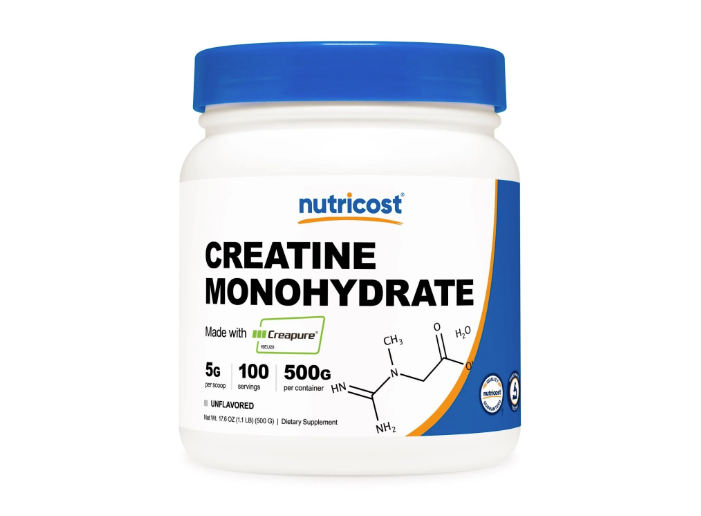Everything you need to know about creatine

Creatine monohydrate is one of the most thoroughly tested and well-researched supplements for strength athletes on the market. Its' performance-boosting and health-promoting effects are robust, and on top of that, it's dirt cheap and highly available! Thus, creatine has rightfully earned its reputation as the gold standard supplement for strength sports.
Abundant research has shown for years that creatine lead to substantial increases in lean mass, anaerobic exercise performance, strength, and power output. Moreover, it is just as beneficial for competitive athletes as it is for older adults, and the general population alike. The jury is still out on whether it benefits endurance athletes, but the evidence points towards some possible improvements here as well. The benefits of creatine aren't limited to strength gains alone. It may also have limited roles in reducing inflammation and improving bone health.

If you're curious about creatine, but hesitant to try it out for yourself, read on for answers to some commonly asked questions that can help inform your decision.
How does creatine work?
At the heart of creatine's effectiveness is its role in replenishing our body's energy currency, ATP (adenosine triphosphate). ATP is the single substance our muscles rely on to contract and produce movement.
During high-intensity or load-bearing exercise, our muscles' demand for ATP can skyrockets up to a staggering 1000 times higher than at rest. In these moments when we most desperately need more ATP, creatine jumps in to donate a phosphate group which leads to much more rapid production of ATP. This fast-tracked assistance is essential, as getting ATP to the muscles quickly determines the intensity and sustainability of our performance during exercise.

How long do I need to take creatine to notice an improvement in performance?
The timeline for creatine to kick in can vary based on your diet, your body composition, your exercise routine, and most notably, your loading strategy.
If you choose to do a loading phase, where you consume a higher dosage of creatine for the first 5-7 days (usually 20 grams daily), then increased strength and muscle size, can be noticeable in as early as a week. This phase is meant to saturate your muscles with creatine more quickly, but it is by no means necessary.
If you decide to skip the loading phase and take the standard dose from the outset (3-5 grams daily), it might take a bit longer, around 3-4 weeks, for your muscles to be completely filled with creatine and for the benefits to become evident.
In any case, once your muscles are saturated with creatine, you should consistently experience its benefits as long as you continue to take it daily. The key thing to remember is that creatine doesn't create a dramatic change overnight, but it produces a slight, cumulative effect over time. So you shouldn't expect all your PRs to instantaneously jump 20% overnight, but rather, you may occasionally find the ability to squeeze out an extra rep on your hardest sets.
Does creatine cause weight gain?

Technically, yes. You can expect to gain a modest amount of weight (around 2-5 lbs) during the first week or so after you introduce creatine. However, this is all due to water weight, and water drawn into your muscles at that. So you can rest assured that you're not gaining fat in this process.
What are the other side effects of creatine supplementation?
If you Google for creatine's side effects, you'll find a whole range of alarmist concerns: from muscle cramps and dehydration to kidney and liver complications. Luckily, we have decades of research that can effectively debunk most of these these worries.

One of the most common concerns cited is that creatine consumption increases a blood marker called creatinine, which is normally indicative of kidney issues. However, creatine has been misattributed as the culprit here. The blood test operates under the assumption that you're not taking a creatine supplement. When you do, you simply get a false positive that has no actual bearing on your kidney health.
Detailed assessments continually show that for healthy individuals, creatine does no measurable harm to our liver or kidneys. Similarly, creatine has never been reliably implicated in the development of conditions such as rhabdomyolysis, dehydration, or muscle cramps.
Other than the weight gain mentioned previously, and minor stomach discomfort in some individuals, there are really no other side effects that have been attributed to creatine alone. However, if you do have any underlying health conditions, it's always wise to double check with a doctor before starting creatine supplementation.
Which form of creatine is the most effective?
Creatine monohydrate is the OG of creatine supplements — it's been extensively researched, it's affordable, and it's effective. While other trendy creatine variations like creatine citrate, ethyl ester, nitrate, and buffered creatine have now been introduced, none have really knocked monohydrate off its pedestal. In the real world, they don't outperform monohydrate, especially when you consider bang for your buck.

Creatine monohydrate does its job well, so why fix something that isn't broken? Pro tip: If you can, go for the solid forms like powder or capsules, since they're most stable. And if you're mixing it in a drink, do it just before you chug for best results.
Can I take creatine alongside caffeine?
Surprisingly, caffeine has been found to counteract some of the benefits of creatine, when they are taken at the same time. One possible explanation has to do with muscle relaxation time. Creatine seems to reduce the time it takes for muscles to relax (which is advantageous during training), while prolonged caffeine use showed the opposite effect, extending this time. When taken together, the positive impact of creatine on relaxation time was neutralized, which could explain the diminished benefits seen.
The experts still haven't come to an agreement on combined creatine and caffeine intake. Some suggest choosing only one or the other, while a more moderate stance recommends staggering the doses (i.e. consuming them at different times of day). In general, it might be prudent at least consume them separately, in order to maximize benefits and reduce potential side effects.

Is creatine right for me?
Creatine monohydrate has been tried and tested for decades. It has emerged as the clear MVP for anyone looking to boost their strength and physical performance. I've personally recommended it to people of various ages, genders, and athletic abilities.
If you're in the market for a safe, effective, and budget-friendly supplement to amp up your strength game, creatine is an obvious choice. But as always, it never hurts to get a second opinion from a medical professional before you dive in!


